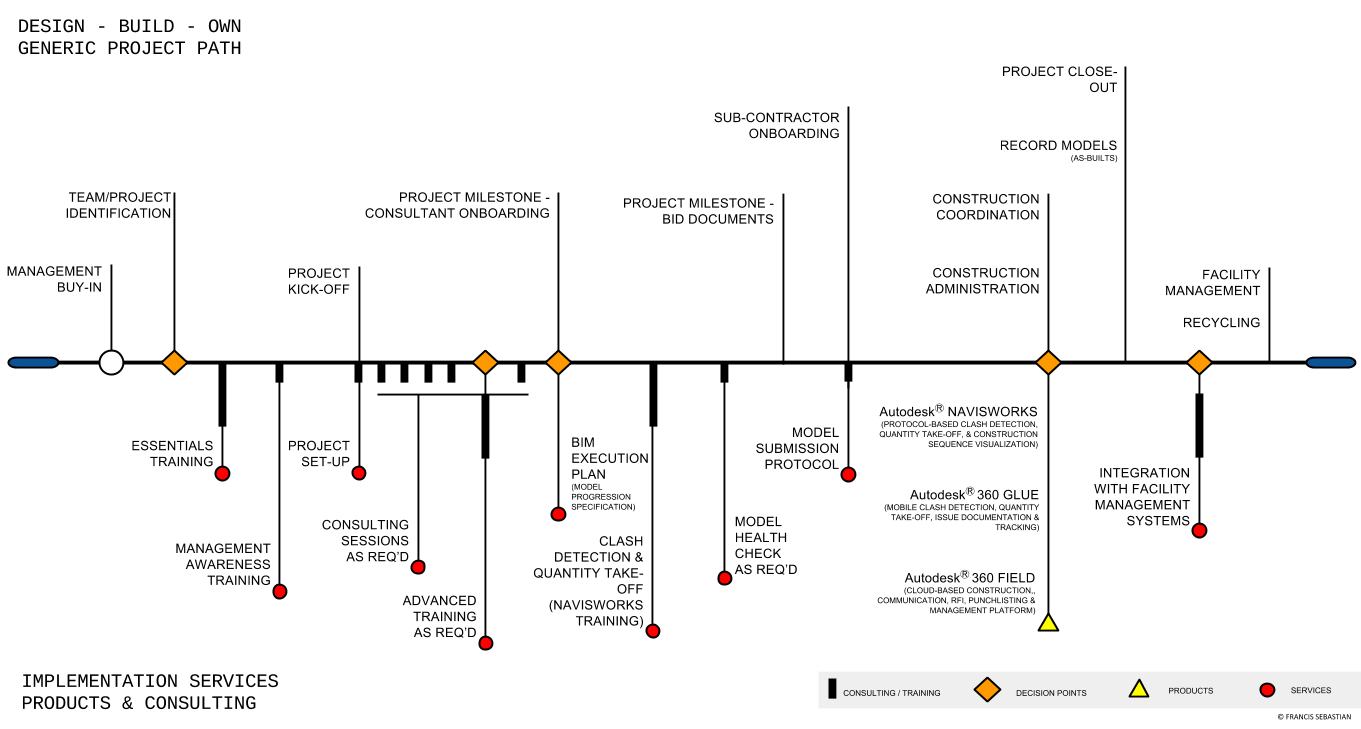
Showing posts with label autodesk. Show all posts
Showing posts with label autodesk. Show all posts
Sunday, May 31, 2015
Monday, March 25, 2013
Revit Adaptive Component: Practical Archetypes - Curved Glass CurtainWalls
[caption id="attachment_455" align="aligncenter" width="480"] Panelization of the Curved Surface using Adaptive Component Families[/caption]
Panelization of the Curved Surface using Adaptive Component Families[/caption]
Curved panels are particularly gnarly! Curved and Non-rectilinear are more so. This is one of those situations where you don't have a choice but to use Adaptive Components.
In this post I'm going to attempt to show how simple the building of a curved and trapezoidal panel can be. So, bring out the rusty trigonometry toolbox (or googling skills) and let's get started!
Curved panels are particularly gnarly! Curved and Non-rectilinear are more so. This is one of those situations where you don't have a choice but to use Adaptive Components.
In this post I'm going to attempt to show how simple the building of a curved and trapezoidal panel can be. So, bring out the rusty trigonometry toolbox (or googling skills) and let's get started!
Labels:
adaptive component
,
adaptive components
,
architecture
,
autodesk
,
component
,
curtain wall
,
curved panels
,
custom components
,
revit
,
Revit 2013
,
workflow
Monday, January 7, 2013
Revit Adaptive Components: Practical Archetypes: The Vaulted Ceiling -Part One
![Groin Vault By Ophelia2 (Own work) [GFDL (http://www.gnu.org/copyleft/fdl.html) or CC-BY-SA-3.0-2.5-2.0-1.0 (http://creativecommons.org/licenses/by-sa/3.0)], via Wikimedia Commons](https://upload.wikimedia.org/wikipedia/commons/thumb/c/cf/Cath%C3%A9drale_Saint-Jean-Baptiste_de_Bazas9.JPG/1024px-Cath%C3%A9drale_Saint-Jean-Baptiste_de_Bazas9.JPG) |
| Ophelia2 (Own work) [GFDL (http://www.gnu.org/copyleft/fdl.html) or CC-BY-SA-3.0-2.5-2.0-1.0 (http://creativecommons.org/licenses/by-sa/3.0)], via Wikimedia Commons[/caption] |
If you had anything to do with buildings in New York, chances are that you may have encountered elaborate, arched or vaulted ceilings. Even if you weren't designing the space 'in-the-manner-of' the gilded age, more often than not, you would have documented what exists and surgically excised or implanted your work into the existing fabric. This is when you realize that these marvels of geometric complexity aren't that perfect. A fairly accurate survey of all the crowns and spring-points of the arches will tell you that all of them are off by a few inches from the ideal geometrical vision of Architecture. Unfortunately, it is a few inches that usually stands in the way of possible and impossible within which most designers have to work with. So, the challenge here is: how do you build a ceiling using Revit that sufficiently accurately mimics the geometrical anomalies of the real world? The answer surprisingly is not that simple...
Labels:
adaptive component
,
autodesk
,
barrel vault
,
Computational Geometry
,
existing building
,
family
,
Geometry
,
groin vault
,
historic building
,
iron python
,
New York
,
renovation
,
revit
,
Revit 2013
,
Vault (architecture)
Tuesday, August 28, 2012
Having Fun with Autodesk Sketchbook Designer for the I-Pad
Sketchbook Designer 2013 from Francis on Vimeo.
Sketchbook Designer 2013 from parametric analytics on Vimeo.
Move over paper napkin! The I-pad (or android device) is here!*
This video is a little test run to see if my rusty sketching skills** would get any better on an I-pad. (Sadly, it does not). But sloppy sketching aside, the Autodesk Sketchbook Designer App has all the tools you need to record ideas (architectural or otherwise) on the fly. I find another app 'Paper' to be a better suit for journal type recording in terms of its interface, but the sheer range of drawing options along with a 'correction' option for those shaky hands make this a handy tool to have at your disposal.
*poor quality pun intended (with due apologies) **No, I don't sketch that fast - I sped up the video 3x
Labels:
architecture
,
arts
,
autodesk
,
drawing
,
illustration
,
paper napkin
,
sketchbook
,
sketchbook designer
,
Sketchbook Designer 2013
,
sketching
,
software
,
technology
Subscribe to:
Posts
(
Atom
)